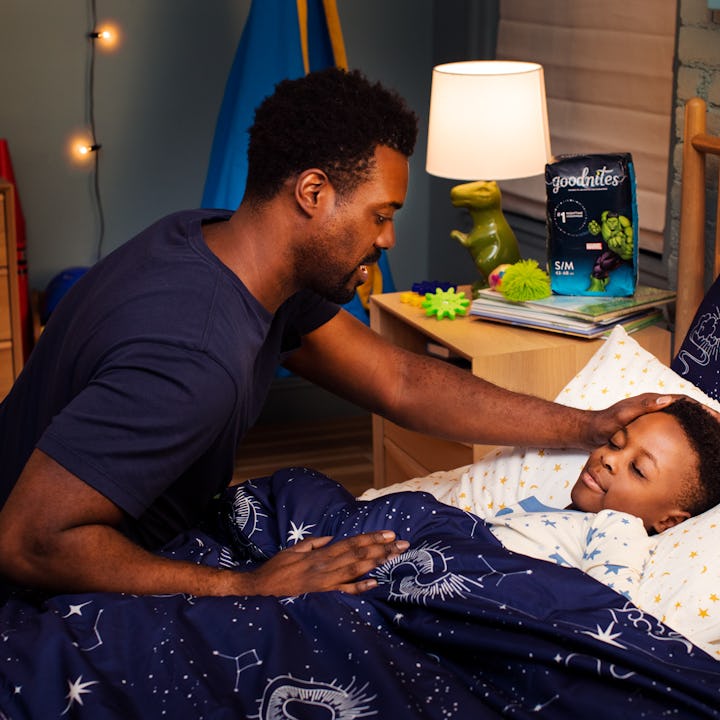How To Handle Your Older Child’s Bedwetting — No Embarrassment Involved
If you’re dealing with an older child’s bedwetting, you’re far from alone.

There’s no panic like the panic that comes with bedwetting. The child panics because they wake in the middle of the night to suddenly being wet, cold, and embarrassed; the parent panics because they have a mess to clean and clothes to change. As the child ages and the bedwetting continues, both sides start to worry about the same thing: Is this normal, and how do I get this to stop?
Bedwetting, especially in children over the age of 7, can feel isolating among both parents and children — how do you chat casually with other parents the way you normally would about everyday parenting issues while respecting your child’s privacy over something that may embarrass them? It’s a tricky place to navigate.
We talked with experts Dr. Sasha Hamdani and Dr. Jonathan Williams, who have partnered with Goodnites, the #1 Bedwetting Underwear* brand, to get some insight into managing bedwetting in older children and how common bedwetting really is in older children.
Bedwetting is far more common than most people think.
If your older child is bedwetting, you’re far from alone. “It’s a shared, although not widely discussed, experience for many families,” says Dr. Jonathan Williams, a board-certified pediatrician and father of five who runs a popular educational TikTok called TikTokKidDoc. “Seek out support from trusted family and friends who can offer an ear and advice. You may soon realize more people than you think have had the same experience.”
This is especially true for parents of neurodivergent children, who often feel isolated as it is. “I wish more parents realized how common bedwetting can be, especially among neurodivergent children,” says Dr. Sasha Hamdani, a board-certified psychiatrist, and author of “Self-Care for People with ADHD” and who has a popular educational TikTok page. “Open conversation and better education is so key to supporting this community.”
A study by Goodnites Bedwetting Underwear confirms that about 1 in 6 children experience bedwetting. Bedwetting is even more common among children with a disability such as Autism or ADHD — about 1 in 10 — though experts aren’t clear on the link between bedwetting and ADHD and Autism.
There are steps you can take to support you and your child compassionately.
If your child is less stressed, you’re likely to be less stressed, so experts agree that the first step is to approach bedwetting with sensitivity and understanding.
“The best thing parents can do for their older children who are experiencing bedwetting is to ensure that [kids] understand their bedwetting is not their fault and they should not feel embarrassed,” says Dr. Williams. It goes without saying that kids are not wetting the bed on purpose, on the contrary they typically can’t wait to stop, so this isn’t something parents should ever be tempted to “discipline” away. The main takeaway here for parents is that our role is to support our kids and protect their self-esteem.
Dr. Hamdani agrees and adds a couple of extra tips for parents, particularly those with neurodivergent children, emphasizing the importance of a predictable nightly routine when it comes to fostering confidence and self-esteem. She also points out the difference that quality nighttime bedwetting underwear can make for kids recommends Goodnites Bedwetting Underwear to help kids wake up dry, which comes in sizes up to XL, fitting kids up to 140 lbs.
Goodnites helps kids have up to 100% leak-free nights, no matter how they sleep. This year, the brand partnered with the Autism Society of America to raise awareness for the needs of families of children with Autism who experience bedwetting and is donating $150,000 to the organization to support ongoing education and community efforts throughout 2023.
Don’t be afraid to consult your physician if you need extra help.
Bedwetting on its own isn’t usually a cause for a visit to the pediatrician, but if you feel overwhelmed or need to understand more about the causes of your child’s bedwetting, don’t be afraid to reach out to a trusted medical professional.
“Bedwetting among older children can have several different causes, so it’s important to monitor your child’s symptoms and visit a doctor, especially if you think there could be a larger underlying cause,” says Dr. Williams. “Bladder size, hormones, and deep sleep can all be causes of bedwetting, and children with Autism, and ADHD tend to have more frequent bedwetting.”
To add to this, Dr. Hamdani suggests that a doctor should be called if, “in addition to wetting the bed, your child has pain when passing urine, is often extra thirsty, has pink or red urine, struggles with constipation, snores, pauses or gasps while breathing in their sleep, has daytime urinating accidents, is having poop accidents, has belly aches, or has back pains.”
Above all, your medical provider is here to help, not judge, and they’ll happily be a part of your team if you let them, and there are also products out there such as Goodnites that can help your child manage bedwetting.
Remember that, as it is with most parenting challenges, bedwetting doesn’t have to be isolating and stressful. Neither you nor your child are alone in this experience, and there are a number of resources available to help you through it. For more information, tools, and product information, visit the Goodnites website.
*Youth Pant Category Share Data